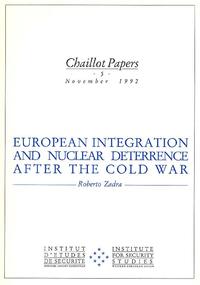EUROPEAN INTEGRATION AND NUCLEAR DETERRENCE AFTER THE COLD WAR
EUROPEAN INTEGRATION AND NUCLEAR DETERRENCE AFTER THE COLD WAR
Author(s): Roberto Zadra
Subject(s): Security and defense, Military policy, Transformation Period (1990 - 2010)
Published by: EUISS European Union Institute for Security Studies
Summary/Abstract: This paper starts from the assumption that a new, credible, coherent and comprehensive Western strategic concept has not yet emerged. This is certainly the case for the Atlantic Alliance. In fact, the `New Strategic Concept' agreed on the occasion of the Alliance's Rome summit in November 1991 is already dated in the sense that it has been overtaken in many ways, particularly by the collapse of the Soviet Union and by recent developments in the newly created independent republics. Furthermore, even if it starts from the comprehensive premise that `security and stability have political, economic, social, and environmental elements as well as the indispensable defence dimension', the new concept does not say much on how to attain this, since the Atlantic Alliance has not traditionally used non-military means to establish European security and stability. For the time being, although major changes in force posture have already been initiated, as a declared policy NATO's strategic concept remains characterised more by traditional ideas than by new thinking. This is particularly evident in the passages of the Rome document dealing with the future role of nuclear weapons: `To protect peace and to prevent war or any kind of coercion, the Alliance will maintain for the foreseeable future an appropriate mix of nuclear and conventional forces based in Europe and kept up to date where necessary, although at a significantly reduced level ... Nuclear weapons make a unique contribution in rendering the risks of any aggression incalculable and unacceptable. Thus, they remain essential to preserve the peace.'
Series: Chaillot Papers
- Page Count: 34
- Publication Year: 1992
- Language: English
- Content File-PDF

